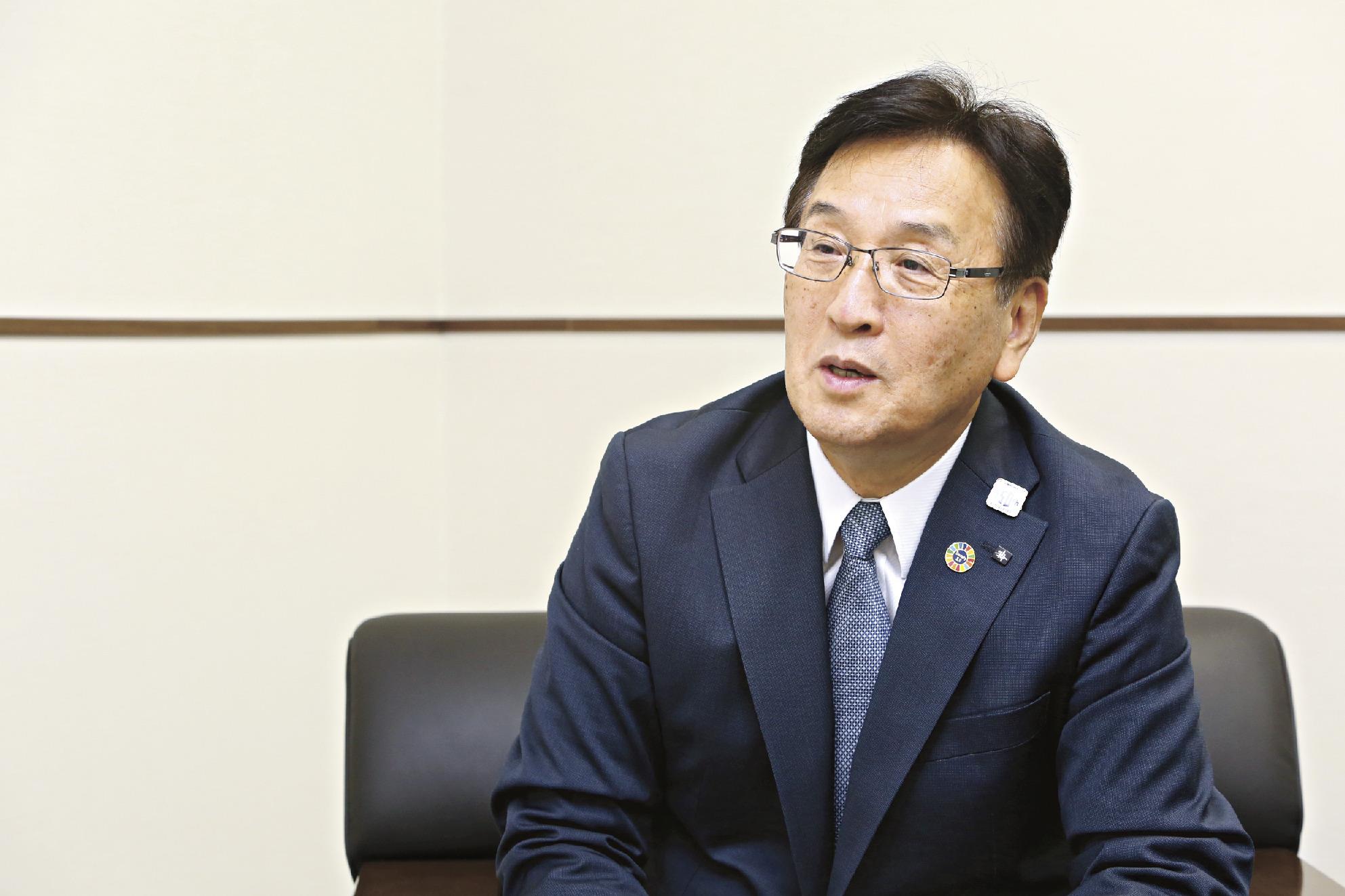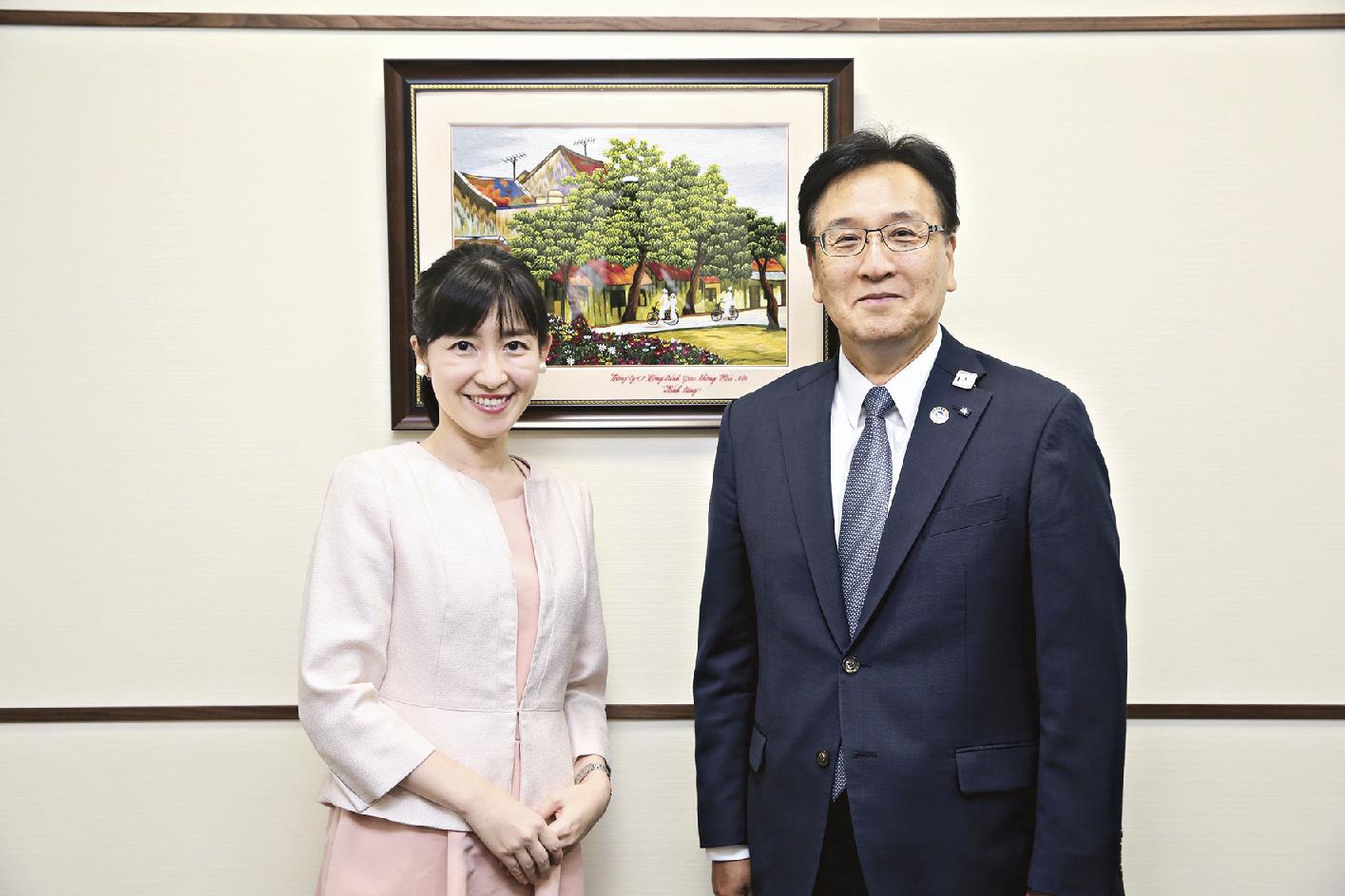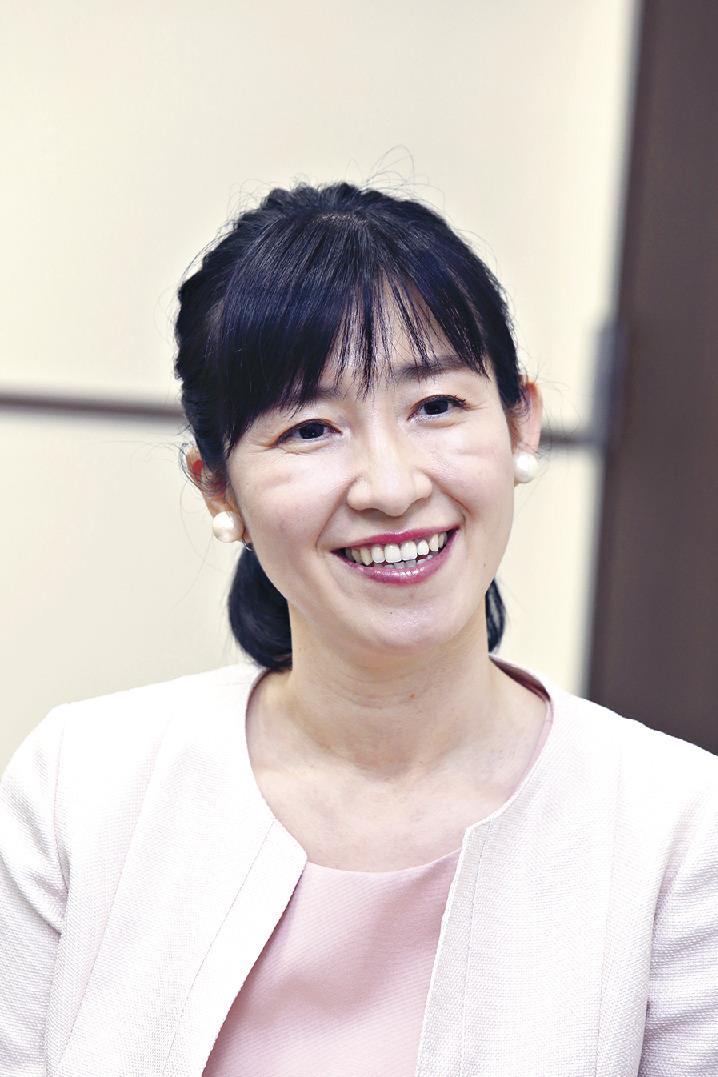◇Inherit pride to the next generation and create a dream industry
Sugar is the social infrastructure that supports people's daily lives and economic activities and when disasters occur , they are important as ``life lines'' for evacuation of residents and transportation emergencies.It also performs functions. The road construction industry, whose mainstay is road paving, plays a role in such road maintenance. Although we face many challenges, such as soaring raw material prices and reforming work styles, we will continue to grow as a sustainable industry while meeting societal needs increasingly diverse and complex such as maintaining and updating existing infrastructure and decarbonization processes. In the 10th part of the Nikkan Kensetsu Kogyo Shimbun 95th anniversary project interview series, we spoke with Yoshinori Nishida, President of the Japan Road Construction Industry Association (Dokenkyo).

Chairman Yoshinori Nishida
□Contribute to people's lives and economic development through post-war reconstruction□
--Please tell us about the role of the road construction industry.
“When you leave home to go to work or school, the first thing you do is use the road. The road construction industry is the social infrastructure industry closest to these people. Their role is not just about road maintenance. When roads are cut off due to natural disasters such as earthquakes, we are the first to quickly arrive at the scene and clear the way for vehicles to pass through to rescue people and transport relief goods. Self-Defense Forces, fire departments Departments and police tend to be the only ones who step up. But before that, we work with road managers to clear the way for them to pass. In this way, it can be said that we play a big role in emergencies, including disaster recovery.''-- Doken Tell us about the association's operating policy.

“Dokenkyo is an association with a long history in the construction industry, founded in 1945. The association has three basic philosophies: promoting road maintenance, improving road construction technology and healthy development. strong road construction industry. From reconstruction to now, we have contributed to people's lives and the development of the Japanese economy through roads, which are core infrastructure.'' ``Previously, the number membership peaked at about 370 companies and has remained at about 160 to 170 companies to date. the past ten years. After all, in our efforts to improve the status of the industry and find leaders, we need many like-minded people, so we are working to increase the number of members by establishing a system Support members. These efforts also resulted in 9 As of the end of the month, the number of members had increased to 211 companies, including 21 supporting members''
Reasonable transfer pricing is urgent due to rising raw material prices □
-- How is the business environment changing?
“Looking at the financial results of major paving companies for the financial year ending March 2023, orders are strong but profit margins for most companies are down. This is due to the unstable international situation due to Russia's invasion of Ukraine and other factors. This has been affected by rising prices of crude oil and construction materials. For asphalt mixtures, we have coordinated with the Japan Asphalt Mixtures Association to request relevant ministries and agencies to approve appropriate prices to cope with rising raw material prices. "

Sumie Sone
In April last year, the government decided on ``Comprehensive emergency measures to address the increase in crude oil prices and prices during the coronavirus pandemic'' and relevant ministries and agencies have issue relevant notices. However, even then, the price of a mixture of crude oil and bitumen. The price of straight bitumen (Stoas), the main raw material, is increasing. Despite its recent stabilization, the Stoas price as of August this year was 175% higher than in September 2020 (193% as of October). ).On the other hand, the price of asphalt mixture is only about 114%, which is a huge difference.'' ``Furthermore, with the volume of road paving work decreasing, the demand for asphalt mixture also decreases.
The volume exceeding 70 million tons in 2000 has now dropped to below 40 million tons. Statistics from April to June this year decreased by 5% compared to the same period last year. environment in terms of construction volume, production volume and profits.''
--What is your outlook for the future road construction market?
``While active public investment is being made under measures such as the ``Five-Year Accelerated Measures for Disaster Prevention, Mitigation and National Resilience,'' there are fresh signs bright in the construction market, but unfortunately in the road market road paving construction is not yet felt. In this context, the revised Basic Act on National Resilience was enacted during the recent regular session of the National Assembly and the development of a medium-term implementation plan was enacted. As a result, measures to protect the safety and security of citizens are being steadily strengthened. ``To provide safe and secure road infrastructure, we need to build the road network, including new construction, establishing maintenance cycles and improving road paving.' ' Adequate and stable public investment is needed for maintenance, repair and renewal. We will continue to ask the ruling party, government and ordering agencies to increase the budget for road paving.'' □Active DX/GX and social contribution activities Promotion □ ---
What is the status of your efforts to achieve carbon neutrality (CN)?
``If you think about road paving in general, asphalt mixtures are produced using heavy oil as fuel, so carbon dioxide (CO2) is mainly produced during production. We are proposing a "low carbon asphalt pavement" that uses intermediate temperature technology that reduces the manufacturing temperature of the composite material from the typical 160 degrees to approximately 130 degrees. By reducing production temperatures by 20 to 30 degrees, CO2 emissions can be reduced. This will reduce carbon emissions by approximately 10 to 20%, which will also result in an improved working environment during construction.''In 2021, we will establish ``
Carbon Neutrality Research Group'' to discuss the current state of low-carbon pavement technology and future policies. We are also looking at actively investing in initiatives related to DX/GX (green transition) and taking all possible measures such as changing asphalt mixture production fuel to clean energy and aim to reduce CO2 emissions by fiscal 2030. We aim to contribute to realizing the government's policy of reducing CO2 emissions by 46% compared to fiscal 2013 and almost to zero by fiscal year 2050. Although mix production is within the scope of the Japan Asphalt Mix Association, we will cooperate together such as donating small generators to roadside stations.
“We have strived to achieve 100% generator ownership at all roadside stations, which are part of the local government's regional disaster prevention plan and serve as a natural disaster prevention base. ears in the event of a disaster. We have donated about 200 so far and have set a target for the last financial year. From this year, we decided to support the ``development of child care support facilities'' at roadside stations nationwide and started donating nursing rooms (equipped with nursing chairs ). ).In the next three years, about 150 sets. We plan to donate the product sets and help maintain the children's corner. This activity aims to send encouragement to the next generation and the generation after that, who will support and build Japan in the future.'' □Harsh environment
. Compensation for working at □
--From April next year, overtime limits with penalties will apply in the construction industry. Working style reform has become an urgent issue in the construction industry.
``The road construction industry uses high-temperature materials on site for construction even on extremely hot days like this summer. Without changing this harsh working environment, we will not be able to secure more workers in the future. We will continue to require ordering organizations, including the private sector, to set construction schedules and schedules that take into account the upper limits regulations and ensure that those involved in maintenance roads in harsh environments will receive appropriate compensation the construction industry, we are proud of our work and we have a mission to ensure that the pride we inherit from our predecessors will be passed on to the next generation. We want to make this industry an industry that people can consider a dream, and an industry that has dreams. When roads are built, private investment will be stimulated. Logistics facilities and factories were built along the roads, and the movement of people was facilitated. This is the history of roads. When roads are built, cities are built. I want to encourage the young people who will lead the next generation to be interested in the road construction industry, the industry related to road infrastructure, which is the key to economic growth and working hard together in a rewarding workplace. I think so".
[Interviewer] Caster Sumie Sone
Graduated from the Department of International Economics, Faculty of Economics, Chuo University. From 2001 to 2009, she worked as an anchor for TBS News Bird (now TBS NEWS). Appeared on Nikkei CNBC since April 2009. Born in Kanagawa Prefecture.






